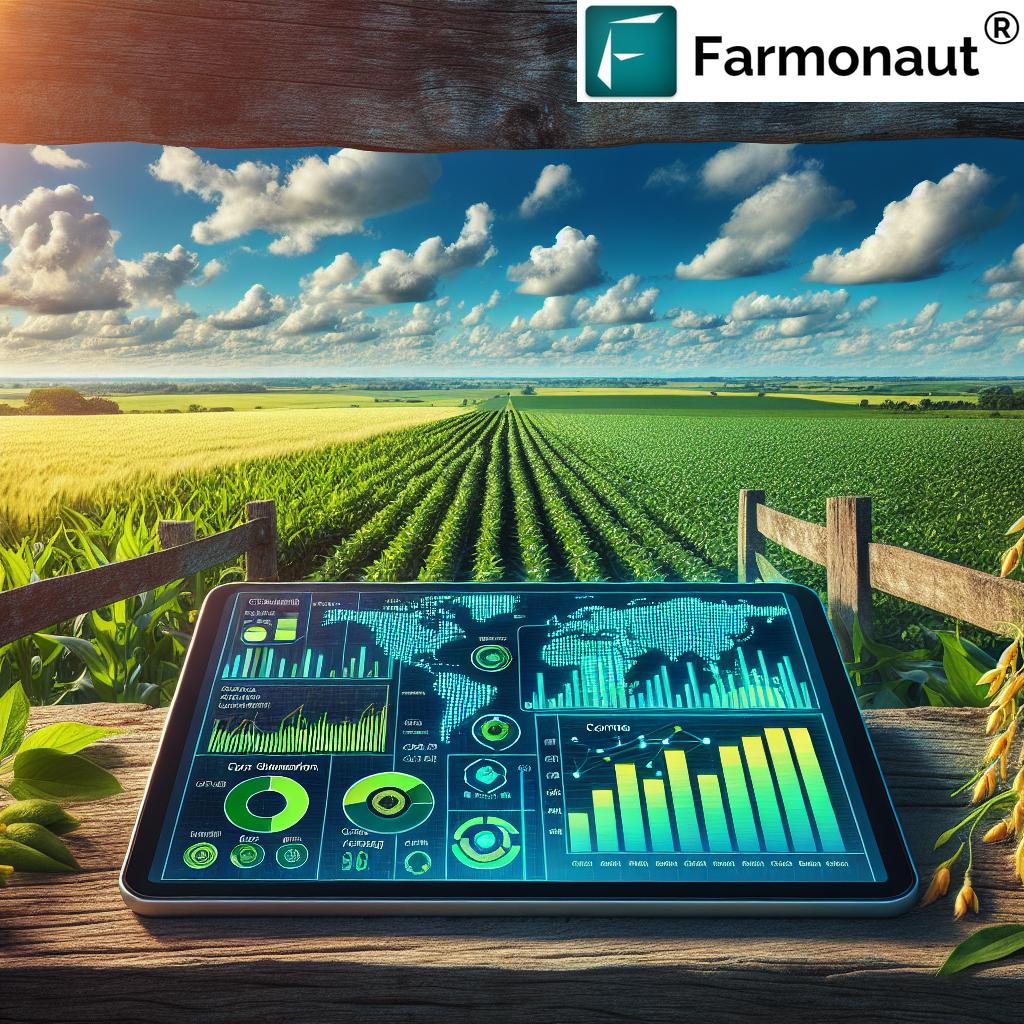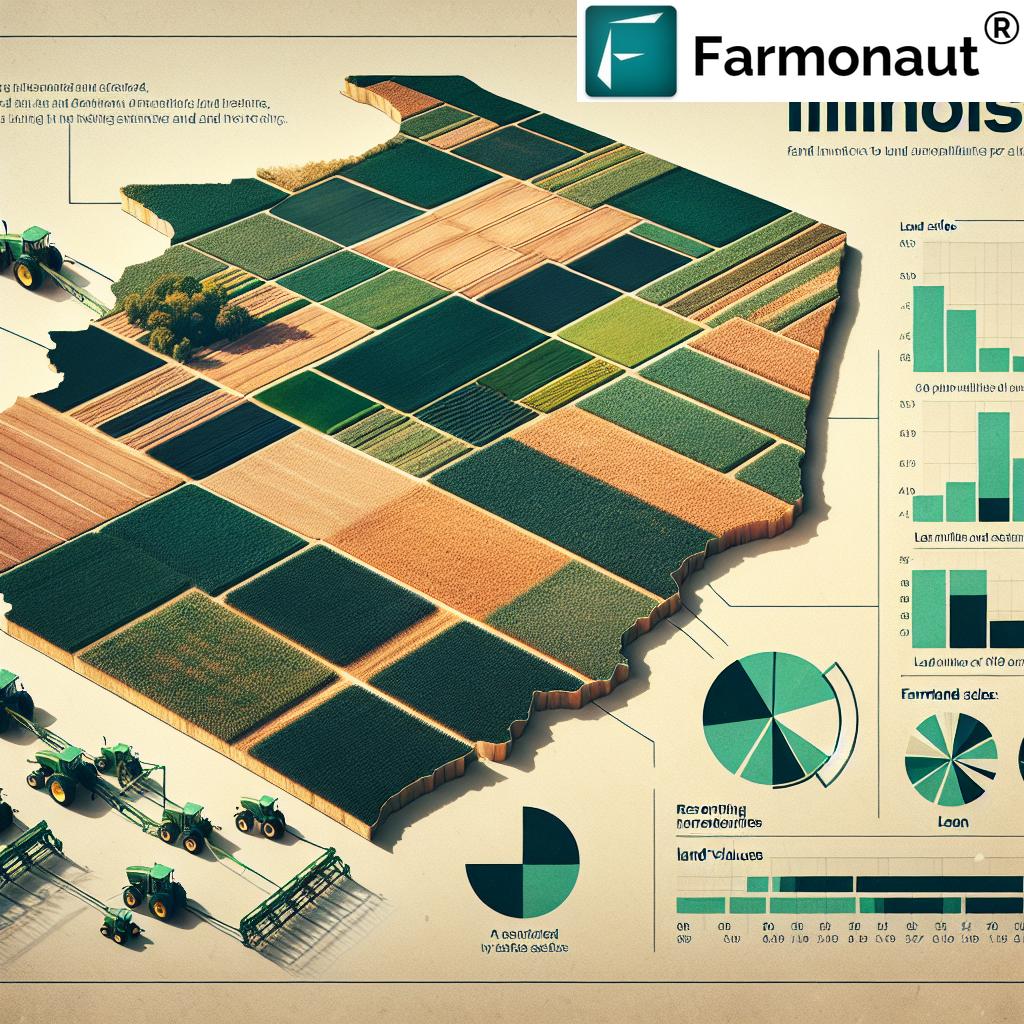Unlocking Illinois Farmland Market Trends: Essential Insights for Agricultural Investors

“Illinois farmland prices can vary by up to 300% between premium Class A lands and lower-grade parcels.”
Welcome to our comprehensive analysis of the Illinois farmland market trends, an essential resource for agricultural investors, farmers, and industry professionals. At Farmonaut, we’re committed to providing you with the most up-to-date and valuable insights to help you make informed decisions in the ever-evolving agricultural sector. Our biannual report offers a deep dive into land sales, prices per acre, and regional market dynamics across multiple counties in Illinois.
Understanding the Illinois Farmland Market Landscape
The Illinois farmland market is a complex and dynamic ecosystem, influenced by various factors ranging from soil quality to economic conditions. As we delve into the latest trends, it’s crucial to understand the nuances that shape this market. Let’s explore some key aspects:
- Regional variations across counties like Champaign, Coles, and Sangamon
- The impact of land classification (Class A, B, C) on farmland values
- Economic factors influencing farmland prices
- The role of farm credit services and agricultural financing
County-Specific Farmland Market Insights
Our analysis covers a wide range of counties, each with its unique characteristics and market dynamics. Let’s take a closer look at some key regions:
Champaign County
Known for its premium agricultural lands, Champaign County consistently shows strong farmland values. The presence of the University of Illinois and its agricultural research programs contributes to the county’s robust farming community.
Sangamon County
As the home of the state capital, Springfield, Sangamon County offers a mix of urban influence and rich agricultural heritage, impacting its farmland market trends.
Iroquois County
With its vast expanse of fertile soil, Iroquois County presents unique opportunities for agricultural investors looking for value in less urbanized areas.
Farmland Price Trends and Analysis
Our comprehensive data analysis reveals fascinating trends in farmland prices across Illinois. Here’s what we’ve observed:
- Premium Class A lands commanding significantly higher prices, often 200-300% more than lower-grade parcels
- Steady price appreciation in counties with strong agricultural output and infrastructure
- Variations in price trends between northern and southern Illinois counties
To give you a clearer picture, let’s look at a detailed breakdown of farmland market trends by county:
| County Name | Average Price per Acre | Land Classification | Year-over-Year Price Change (%) | Notable Factors Influencing Price |
|---|---|---|---|---|
| Champaign | $12,500 | A | +5.2% | High-quality soil, proximity to research facilities |
| McLean | $11,800 | A | +4.8% | Large farm sizes, strong local economy |
| DeKalb | $11,200 | A | +4.5% | Excellent soil quality, proximity to Chicago markets |
| Sangamon | $10,500 | B | +3.9% | Mixed urban-rural landscape, state capital influence |
| Morgan | $9,800 | B | +3.2% | Diverse crop production, stable local farming community |
This table provides a snapshot of the diverse farmland market across Illinois. It’s important to note that these figures are estimates and can vary based on specific property characteristics and local market conditions.
Factors Influencing Farmland Values
Several key factors contribute to the valuation of farmland in Illinois:
- Soil Quality: Premium Class A lands with high fertility command top prices.
- Location: Proximity to markets, transportation infrastructure, and urban centers impacts value.
- Water Access: Reliable water sources for irrigation can significantly boost land prices.
- Economic Conditions: Crop prices, interest rates, and overall economic health play crucial roles.
- Local Development: Potential for future development can increase land values, especially near expanding urban areas.
“Farmonaut’s biannual report analyzes land sales data from over 50 counties in Illinois, providing comprehensive market insights.”
The Role of Farm Credit Services and Agricultural Financing
Access to financing plays a crucial role in the farmland market. Farm credit services and loan options are essential for many investors and farmers looking to expand or maintain their operations. Here’s how these financial tools impact the market:
- Farm Loans: Competitive interest rates and flexible terms can stimulate farmland purchases.
- Crop Insurance: Risk management tools like crop insurance can make farmland investment more attractive.
- Government Programs: Federal and state agricultural programs can influence land values and investment decisions.
At Farmonaut, we provide tools and insights to help you navigate these financial aspects of farmland investment. Our platform offers:
- Real-time data on land values to inform loan applications
- Crop monitoring tools to support insurance claims and risk assessment
- Market analysis to help you make informed financing decisions
Explore our comprehensive suite of tools:
Regional Market Dynamics
Illinois’s diverse geography creates distinct regional market dynamics. Let’s explore some key regions:
Central Illinois
Counties like Macon, Christian, and Sangamon form the heart of Illinois’s corn belt. This region typically sees strong and stable farmland values due to its exceptionally fertile soil and established farming infrastructure.
Northern Illinois
Proximity to Chicago influences land values in counties like DeKalb and Ford. Here, urban expansion and the potential for future development can drive up prices, especially for lands on the urban fringe.
Southern Illinois
Counties such as Jefferson and Clay often present more varied land quality and lower average prices compared to central and northern regions. However, this area can offer unique opportunities for diversified farming and potential value appreciation.
Trends in Land Sales and Transactions
Our analysis of recent land sales reveals several interesting trends:
- Increased interest in medium-sized parcels (80-160 acres) from both individual farmers and investors
- Growing demand for farmland with established conservation practices
- Rise in online and virtual land auctions, especially in the wake of recent global events
- Steady interest from institutional investors looking to diversify their portfolios
These trends underscore the dynamic nature of the Illinois farmland market and the importance of staying informed about local and regional variations.
The Impact of Technology on Farmland Values
Technological advancements are increasingly influencing farmland values and investment decisions. At Farmonaut, we’re at the forefront of this technological revolution in agriculture. Here’s how technology is shaping the market:
- Precision Agriculture: Lands equipped with or suitable for precision farming techniques often command premium prices.
- Satellite Monitoring: Our satellite-based crop health monitoring tools provide invaluable data for assessing land productivity and potential.
- Data-Driven Decision Making: Access to comprehensive data analytics helps investors make more informed decisions about land purchases.
Farmonaut’s platform integrates these technological advancements, offering you:
- Real-time crop health monitoring
- AI-powered advisory systems for optimized farm management
- Blockchain-based traceability for enhanced supply chain management
Explore our API for advanced data integration:
Future Outlook and Market Forecasts
As we look to the future of the Illinois farmland market, several factors are likely to shape trends:
- Climate Change: Shifting weather patterns may influence crop viability and land values in different regions.
- Technological Integration: Farms with advanced technological infrastructure may see increased demand.
- Sustainable Farming Practices: Growing emphasis on sustainability could drive interest in lands suitable for organic or regenerative agriculture.
- Global Food Demand: Increasing world population and changing diets may bolster the long-term value of productive farmland.
Our forecasts suggest a continued steady appreciation in farmland values, particularly for high-quality lands in prime agricultural areas. However, investors should remain vigilant about regional variations and potential impacts of broader economic factors.

Leveraging Farmonaut’s Tools for Investment Success
At Farmonaut, we’re committed to empowering agricultural investors with cutting-edge tools and insights. Our platform offers:
- Satellite-Based Crop Monitoring: Real-time insights into crop health and productivity across your investment portfolio.
- AI-Powered Advisory: Personalized recommendations for optimizing land use and crop management.
- Market Analytics: Comprehensive data on land sales, price trends, and regional market dynamics.
- Sustainability Metrics: Tools to assess and improve the environmental footprint of agricultural investments.
By integrating these advanced technologies, we help you make data-driven decisions that can enhance the value and productivity of your farmland investments.
The Role of Community and Networking in Farmland Investment
Success in farmland investment often relies on strong community connections and industry networks. Illinois boasts a robust agricultural community with numerous resources for investors:
- Local Farm Bureaus: Excellent sources for regional insights and networking opportunities.
- Agricultural Cooperatives: Provide valuable services and market access for farmland owners.
- University Extension Programs: Offer educational resources and cutting-edge research in agriculture.
- Industry Events and Conferences: Opportunities to stay updated on market trends and connect with fellow investors.
Farmonaut supports this community-driven approach by providing platforms for knowledge sharing and collaboration among our users.
Navigating Regulatory and Environmental Considerations
Farmland investors must be aware of various regulatory and environmental factors that can impact their investments:
- Zoning Laws: Understanding local zoning regulations is crucial for determining land use possibilities.
- Environmental Regulations: Compliance with water usage, pesticide application, and soil conservation laws is essential.
- Tax Considerations: Farmland investments can have unique tax implications, including potential benefits for agricultural use.
- Conservation Programs: Participation in federal or state conservation programs can provide financial incentives and improve land value.
Our platform at Farmonaut helps you stay informed about these considerations, ensuring your investments remain compliant and environmentally responsible.
Maximizing Returns: Strategies for Farmland Investors
To help you maximize the potential of your farmland investments, consider these strategies:
- Diversification: Spread investments across different regions and land types to mitigate risk.
- Value-Add Improvements: Consider investments in irrigation, drainage, or soil health to enhance land productivity and value.
- Leasing Strategies: Explore flexible leasing arrangements to optimize returns while managing risk.
- Sustainable Practices: Implement conservation techniques that can improve long-term land value and productivity.
- Technology Integration: Utilize Farmonaut’s advanced tools for data-driven decision-making and efficient farm management.
By combining these strategies with the insights provided by our comprehensive market analysis, you can position yourself for success in the Illinois farmland market.
Conclusion: Empowering Your Farmland Investment Decisions
The Illinois farmland market offers diverse opportunities for investors, from the rich soils of Champaign County to the strategic locations of Sangamon and Iroquois counties. By leveraging Farmonaut’s comprehensive tools and insights, you can navigate this complex market with confidence.
Remember, successful farmland investment requires a blend of local knowledge, market awareness, and technological savvy. Our biannual report, coupled with our advanced satellite monitoring and AI advisory systems, provides you with the edge needed to make informed decisions in this ever-evolving sector.
Whether you’re looking to buy, sell, or optimize your current farmland holdings, Farmonaut is your partner in unlocking the full potential of agricultural investments in Illinois and beyond.
Frequently Asked Questions (FAQ)
- Q: What factors most significantly impact farmland prices in Illinois?
A: The most significant factors include soil quality, location, water access, economic conditions, and potential for development. - Q: How often should I reassess my farmland investments?
A: We recommend a thorough assessment at least annually, with more frequent monitoring of market trends and crop conditions using tools like Farmonaut’s satellite monitoring system. - Q: Are there specific regions in Illinois that are particularly promising for farmland investment?
A: Central Illinois counties like Champaign and McLean consistently show strong farmland values due to their excellent soil quality. However, opportunities exist across the state depending on your investment goals. - Q: How can Farmonaut’s technology help me manage my farmland investments?
A: Our platform provides real-time crop health monitoring, AI-powered advisory services, and comprehensive market analytics to help you make informed decisions and optimize your farmland’s productivity and value. - Q: What role does sustainable farming play in farmland investment?
A: Sustainable farming practices are increasingly important, often leading to improved soil health, better long-term productivity, and potentially higher land values. Farmonaut’s tools can help you implement and monitor sustainable practices on your farmland.
Stay ahead in the dynamic world of agricultural investment with Farmonaut’s cutting-edge solutions. Explore our subscription options above to access our full suite of tools and insights, tailored to your investment needs.






